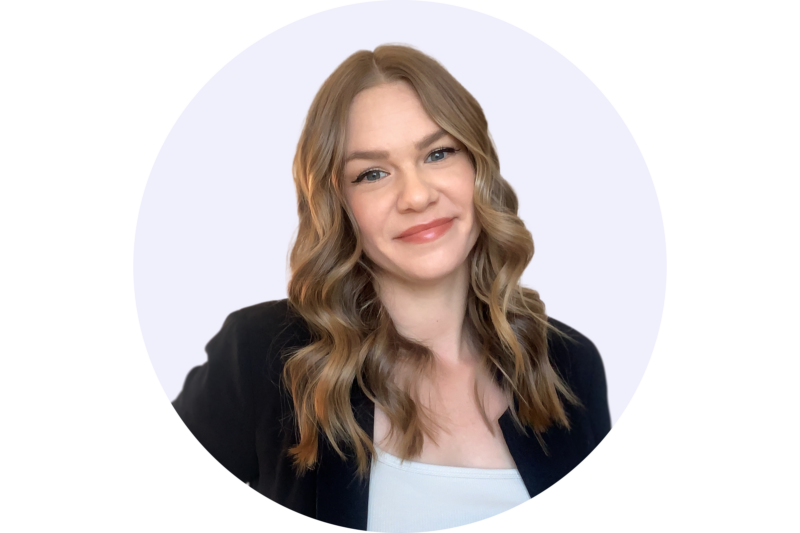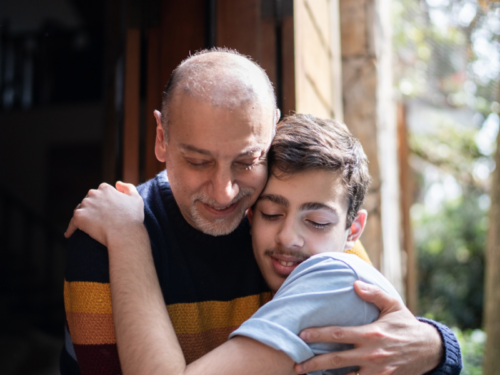
Table of Contents
Here’s What You Need to Know About Neurodivergence and OCD

Written By: Sarah Fielding

Clinically Reviewed By: Sarah Lyter
June 6, 2024
7 min.
A person can choose whether they label themselves as neurodivergent, including people living with obsessive-compulsive disorder (OCD).
Learn more about our Clinical Review Process
Table of Contents
We, fortunately, live at a time where there is increasing openness toward understanding people living with learning disabilities, mental and behavioral health disorders, and other atypical ways of viewing or processing the world. However, there is still a long way to go towards undoing stigmas and creating safe and accommodating spaces for neurodiverse people — loosely defined as those who think and feel differently than a neurotypical person.
Some people with obsessive-compulsive disorder (OCD), a condition marked by obsessive thoughts and compulsive behaviors, might wonder if their diagnosis falls into this category. In short, there’s no one answer to that question, and people need to define themselves on their own terms (one of the efforts of the neurodiversity movement). This self-assigned label might be discovered as a young person or adult and can even change over time. Below, we’ll delve into a bit of the history of neurodiversity — including what it means and who it might apply to — in an effort to understand if OCD is neurodivergent.

We can help you cope with OCD
Neurodivergent-affirming therapy for adolescents and young adults.
Is OCD neurodivergent?
As mentioned, the answer is complicated. Some people argue yes, while others aren’t as clear-cut on the issue. At the end of the day, it’s entirely up to the individual whether they choose to identify as neurodivergent — a choice that may be dictated by how OCD impacts their daily life, relationships, and sense of self.
For instance, someone with OCD may choose to embrace the neurodivergent label if their experiences with OCD significantly impact various aspects of their life. This could involve how they manage their daily routines, navigate relationships with others, and perceive themselves.
On the other hand, another person might not perceive their OCD as part of the neurodivergent umbrella. This could be because their experiences with their condition are less pronounced or because they simply don’t feel that the neurodivergent label resonates with their sense of self. Ultimately, it’s about personal perspective and how people choose to interpret and label their experiences.
“Yes, OCD is neurodivergent”
“No, OCD is not neurodivergent”
- Recognizes experiences of people with OCD as legitimate variations in brain functioning
- Might be a stance taken by people for whom OCD significantly impacts various aspects of their life
- Recognizes experiences of people with OCD as part of the normal spectrum of human variation rather than as divergent from the norm
- Might be a stance taken by people for whom OCD does not significantly impact various aspects of their life
Can you have OCD and other types of neurodivergence?
In short, yes, it’s possible to have OCD and other neurodivergent conditions — in fact, it may be common in some cases. Here’s how OCD can co-occur with other neurodivergent conditions:
Attention-deficit hyperactivity disorder (ADHD)
OCD and ADHD often occur together and can significantly impact daily life. Recent research suggests that about 11.8% of people with OCD also have ADHD, with a higher rate of 25.5% in pediatric OCD patients. Having both disorders from a young age is linked to more severe OCD symptoms and longer-lasting issues.
Autism spectrum disorder (ASD)
Many people with ASD exhibit repetitive behaviors and intense interests, which can sometimes overlap with OCD symptoms. One study of over 3.3 million people tracked for nearly two decades found that people with OCD had a 13 times higher chance of also having ASD compared to those without OCD.
Anxiety and mood disorders
Anxiety and mood disorders like depression are sometimes considered neurodivergent conditions — much in the same way that OCD can be. And there’s a strong overlap between the kinds of conditions. A 2021 study found that 69% of people with OCD have a co-occurring condition, with mood and anxiety disorders among the most common in adolescents and adults.
What is neurodivergence?
To better understand whether OCD is neurodivergent, let’s delve a little bit into what constitutes neurodivergence itself. According to the National Institutes of Health, neurodiversity is “the idea that people experience and interact with the world around them in many ways, with no one ‘right’ way of thinking, learning, and behaving, and differences are not deficits.” Australian sociologist Judy Singer first introduced the term in the 1990s as a way to champion inclusion and equality for people who experienced the world in a different way.
The conversation around neurodivergence has evolved into a social justice movement, advocating for all individuals to have respect and care while living without stigma. It should go without saying, but a neurodivergent person deserves to pursue their dreams and the chance to show the world all the amazing things they come up with while doing it. Also, if someone’s brain function is a bit different than another person’s, it gives them many opportunities to learn from each other and see the world in new ways. Each person’s experience is unique and worthwhile and deserves to be treated as such.
There’s no clear definition of neurodivergence or firm line regarding what conditions it covers. As a result, the exact number of neurodiverse people worldwide is unclear, but researchers estimate it to be about 15 to 20% of individuals. Neurodivergence has often been associated with Autism but can apply to a range of conditions, from neurodevelopmental disorders, like ADHD, to genetic conditions, like Down syndrome. A person might also experience one or more of these neurodivergent conditions with a mental health condition, such as an anxiety disorder or depression. Their experiences facing stigma or exclusion can also lead to adverse mental health symptoms.

On top of potentially fueling a mental health condition, the ongoing stigma can impact neurodivergent people in a myriad of ways, such as employment opportunities. According to some reported estimates, the unemployment rate of neurodivergent people is 30 to 40% in the United States. A 2020 report found that 32% of UK employers in the engineering, manufacturing, and construction industries were negative about hiring someone living with ASD. The same study found that 60% of people living with ASD reported that their workplace excludes neurodivergent employees, compared to 28% of neurotypical individuals surveyed. This, along with so many other apparent factors — not to mention the human right for individuals to state what they believe is best for themselves — highlights the importance of the neurodiversity movement being led and guided by the voices and experiences of neurodivergent individuals.
Can you have OCD and other mental health conditions?
Yes, in fact, for a long time, OCD was considered an anxiety disorder, and it wasn’t until 2013 that OCD moved to the category “obsessive-compulsive and related conditions” in The Diagnostic and Statistical Manual of Mental Disorders (DSM-5). These related conditions include hoarding disorder and body dysmorphic disorder. This change was made to reflect the core symptoms of OCD, like intrusive thoughts (known as obsessions) and repetitive behavior (known as compulsions). Obsessions can include intrusive thoughts about anything from germs to taboo thoughts, and compulsions can include repetitive behaviors like excessive hand washing and compulsive counting. In essence, a person living with OCD might experience anxiety, but it’s not the primary sign.
People living with OCD will typically spend at least an hour a day on either obsessive thoughts or compulsive behavior. “An individual may experience an obsessive or intrusive thought that serious harm will come to their family if they do not count each tile on their kitchen floor five times before leaving for work or school,” says Charlie Health Psychiatric Mental Health Nurse Practitioner Rebecca Holland, PMHNP-BC. “Regardless of external factors, a person with OCD will be unable to move past this thought unless the thought and behavior are completed.” She added that people may have varying levels of insight into these symptoms. “Some people understand logically that counting the tiles does not correlate to their family’s safety, while others experience a delusion-like intensity of symptoms,” she said.
OCD can be more than the urge to touch or move something, though. It can involve a sensory experience, such as “things sounding or feeling ‘right’ in order to be complete or comfortable. Individuals with OCD can experience ‘accommodating’ like behaviors to avoid situations, individuals, or places that can provoke serious panic or feelings of intrusiveness,” says Holland.
As mentioned above, the obsessive thoughts and repetitive behaviors associated with OCD can consume a significant amount of time and energy, interfering with daily activities, relationships, and overall quality of life. The persistent nature of OCD symptoms can lead to anxiety, depression, and feelings of shame or guilt. Additionally, the chronic stress from managing OCD symptoms can contribute to physical health issues and further exacerbate mental health challenges. Overall, OCD can have a profound effect on mental well-being, making it crucial for people to seek appropriate treatment and support.

How Charlie Health can help
If you or a young person in your life is struggling with the obsessive thoughts and compulsive behaviors that define OCD, Charlie Health is here to help. Charlie Health’s virtual Intensive Outpatient Program (IOP) provides more than once-weekly mental health treatment for young people and families dealing with serious mental health conditions, including OCD. Our expert clinicians incorporate evidence-based therapies into individual counseling, family therapy, and group sessions. We also have neurodivergent-specific programming to support neurodivergent clients. With this kind of holistic treatment, managing your mental health is possible. Fill out the form below or give us a call to start healing today.
References
https://pubmed.ncbi.nlm.nih.gov/32996572/
https://www.nimh.nih.gov/health/topics/obsessive-compulsive-disorder-ocd
https://www.neurodiversityhub.org/what-is-neurodiversity
https://www.nih.gov/nih-style-guide/autism
https://www.ncbi.nlm.nih.gov/pmc/articles/PMC8631971/




